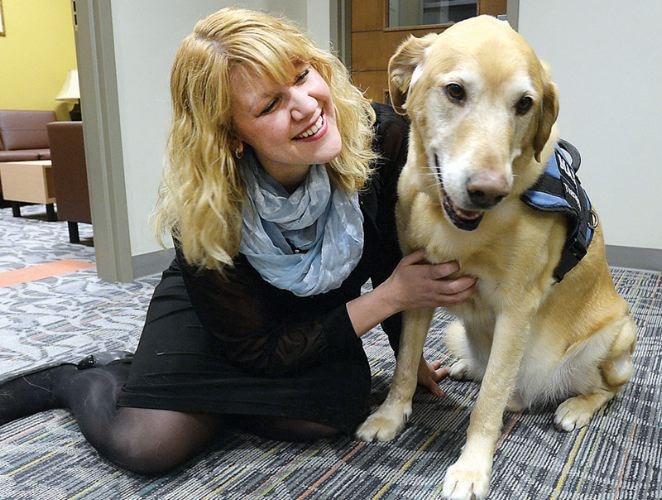A tail-wagging furry friend is now appearing at the Prince George courthouse to help ease the stress victims and witnesses often face when they're about to take the stand.
Max, a seven-year-old yellow Labrador Retriever and trained therapy dog, won't be able to accompany anyone into the actual courtroom but he can be there to provide a level of reassurance right up to that point.
He did as much on Tuesday, his first day on that particular job.
"They asked if Max would come and sit with her and keep her calm and so far so good, it went really well," said Krista Levar, the Prince George RCMP's victim services coordinator and the dog's handler. "He was very welcomed over at the courthouse and I think he feels like a bit of a star going up those stairs."
Levar pitched the idea to Judge Michael Brecknell, the administrative judge for the provincial court's northern region, in September and Max was subsequently given courtesy access within the courthouse.
As a victim services worker, Levar said she can do only so much to settle a witness's nerves, particularly since the law prohibits her from talking with the witness about the case at hand.
"You want to provide support but you don't want to affect testimony. But with Max there, I think that tension is broken and sometimes you just don't need to talk as much when a dog is there and becomes the focus of the conversation.
"They're just calming and soothing."
Max went through extensive training with the help of Pawsitive Horizons. Next steps include teaching him sign language so he can be commanded from a distance, which will help in a courtroom, where verbal commands could interrupt proceedings.
Policy is also being developed around allowing therapy dogs into the courtroom during trials.
Just one other courthouse in B.C. - Surrey Pretrial - allows a therapy dog past its doors and only under circumstances similar to how they're used in Prince George. Levar said a therapy dog has been allowed in a Canadian courtroom during a trial just once so far - that occurred in Calgary.
But it's becoming more common in the United States and interest is growing in Canada. Levar said she's had queries of interest from as far away as Ontario as well as from around B.C.
"It's just such a positive program that people want to be engaged and be a part of it," Levar said.



